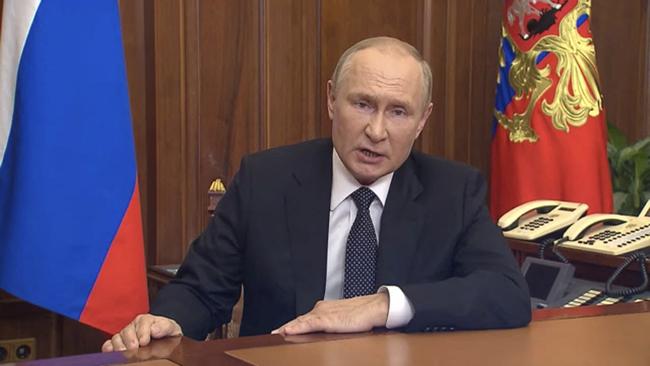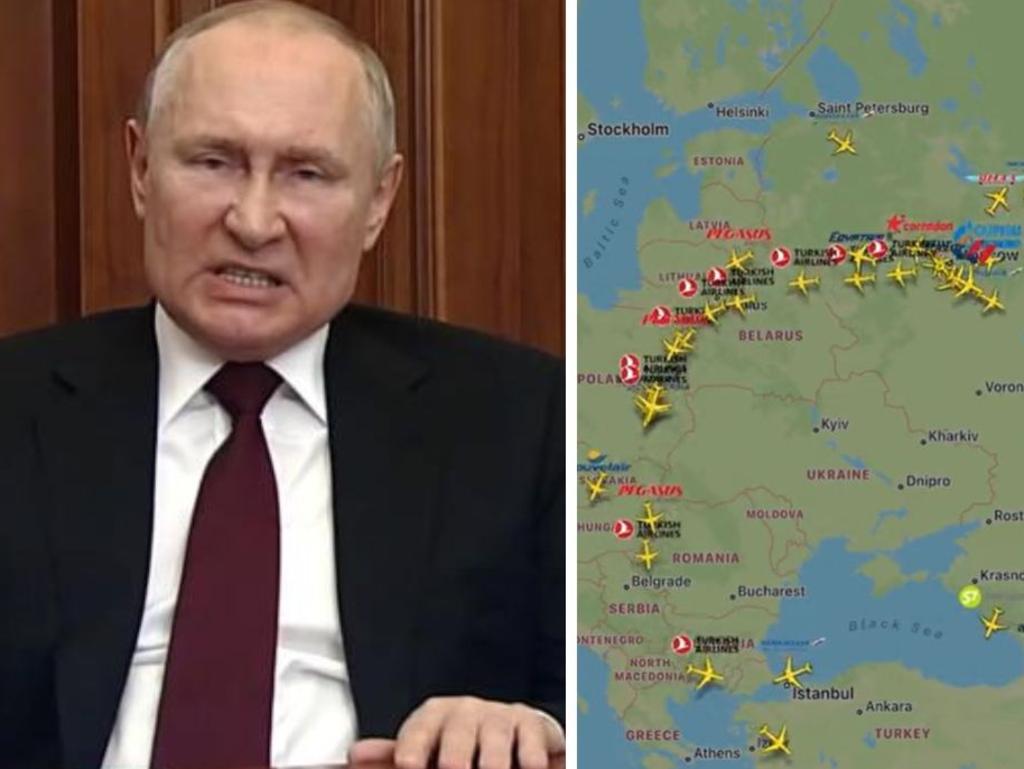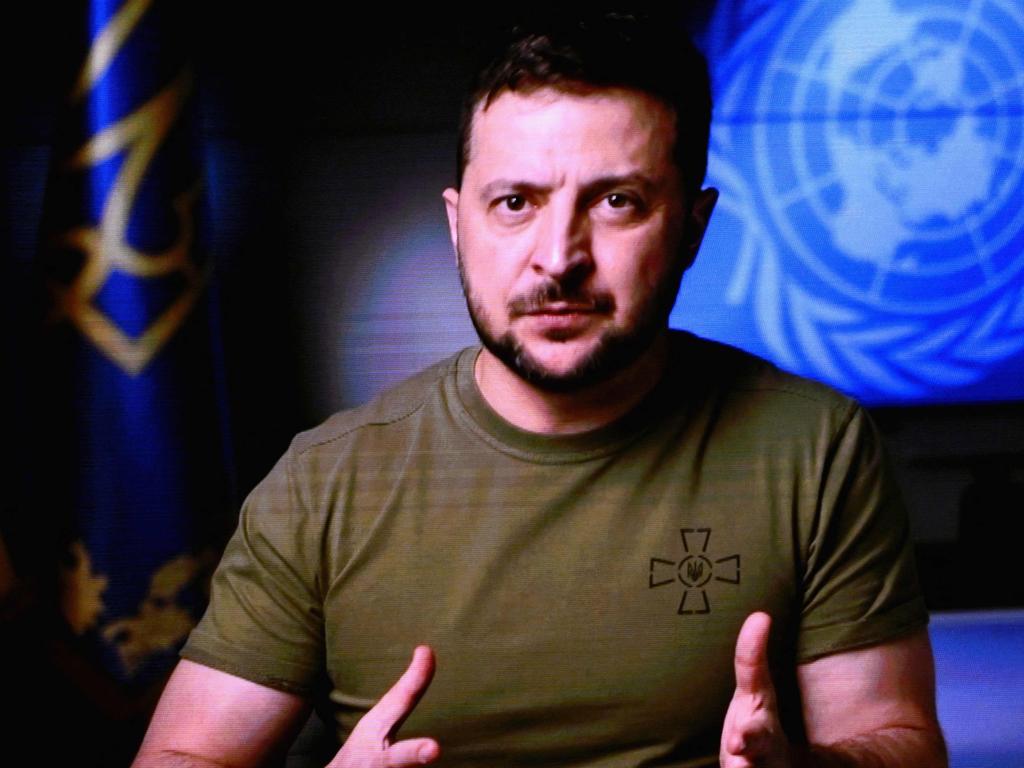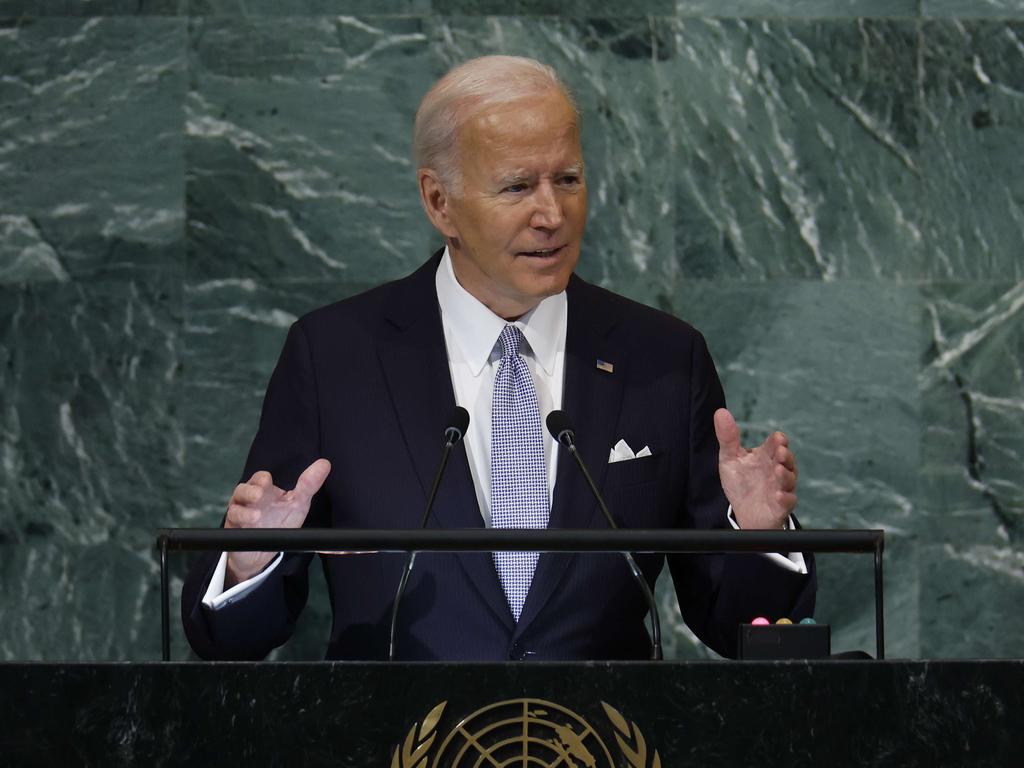West can’t ignore or give in to Putin’s threats
Vladimir Putin has threatened the West with nuclear war. The cornered Russian President is both unpredictable and dangerous.

– Russian President Vladimir Putin, address to the nation
Russia is making irresponsible nuclear threats to use nuclear weapons. China is conducting an unprecedented, concerning nuclear build-up without any transparency
– US President Joe Biden, speaking to the United Nations
Vladimir Putin has threatened the West with nuclear war. But his at-times almost demented televised address to his nation revealed weakness as well as will, pressure as well as power, desperation as much as decision. Putin, who commands thousands of nuclear weapons, one of the world’s biggest militaries and the largest land mass of any nation, as well as a huge supply of the critical energy commodity the whole world needs, is not yet a busted flush. But he is under immense pressure. As such, he’s never been more dangerous.
He could not have been more explicit in his nuclear threats: “In the event of a threat to the territorial integrity of our country and to defend Russia and our people, we will certainly make use of all weapons systems available to us. This is not a bluff.”
As he plans to formally annex parts of Ukraine, theoretically he can then claim those are Russian territory and attacks on them would justify nuclear response. Elements of the speech were either dark fantasy or propaganda so blatantly unrealistic as to be not so much an attempt to describe reality as to create reality. Thus the democratically elected Ukrainian government of Volodymyr Zelensky, who happens to be Jewish, was constantly referred to by Putin as “neo-Nazi”. The Russian leader claimed the Ukrainian government, since 2014, had committed “genocide” against its domestic opponents.
But Putin’s rich hatred of the Ukrainian government is surpassed by his hatred of the West, which he claims is determined to destroy Russia altogether. Even weirder still, Putin alleged that some NATO leaders made statements “on the possibility and admissibility of using weapons of mass destruction – nuclear weapons – against Russia”.
It’s too easy to dismiss all this as bluster. Putin makes a lot of threats that he doesn’t carry through. But most of what he has said in the past has reflected his intentions. Not only that, unequivocal defeat in Ukraine would threaten Putin personally in ways he would find intolerable. He has a long history of confronting crisis through escalation. Nothing can be ruled out.
It would be wrong to give in to Putin’s threats. It would be equally wrong to ignore them. Putin’s people didn’t ignore them. Despite Russia being one of the harshest and most repressive authoritarian states in the world, tens of thousands of Russians took to the streets to demonstrate against the mobilisation. Hundreds were arrested. Flights out of the country were crammed. No male of fighting age not already in the army wants to be conscripted.
The Ukraine war is now seven months old. The Putin speech, in which he announced the mobilisation of some 300,000 military reservists and the potential mobilisation of many more men of fighting age, was brought about by a stunning series of military victories by the Ukrainians.
When Putin launched his invasion in February he had 200,000 Russian troops on Ukraine’s borders. These included thousands of special forces, hundreds of tanks, extensive air force cover and huge quantities of artillery. Moscow already controlled large chunks of Ukraine, notably the Crimean peninsula and parts of Donbas. Russia had a long border with Ukraine to launch offensives from and support from neighbouring Belarus, which also has a long border with Ukraine.
Putin expected his forces to take the Ukrainian capital, Kyiv, in days, and told his people “the special military operation” would be swift. Most Western military analysts basically agreed with Putin’s assessment. The consensus view was the Russians would be able to take Ukraine quickly, but 200,000 was probably not a big enough force to hold the entire country.
Putin’s idea, presumably, was to set up a puppet regime in Kyiv which would defer to him, as the government of Belarus does.
But the Ukraine war has up-ended all manner of conventional military thinking. In Russia’s earlier partial invasion of Ukraine in 2014, in which it took Crimea, it deployed a “hybrid warfare” model, using irregulars who did not wear Russian uniforms and then bringing in conventional Russian military forces to complete the conquest.
But in this case the Ukrainians pioneered their own hybrid warfare against the invading Russians. One thing analysts missed from the start was the asymmetry in motivation. Ukrainians were fighting for their homeland and fought passionately and brilliantly and almost impossibly bravely. The Russian troops, once they suffered setbacks, had no real idea why they were there at all.
The first critical moment was Ukraine’s decision to fight. You could make half an ethical case that if the Ukrainians had gone along with Russian domination they would still have retained a degree of local autonomy and mostly avoided bloodshed.
But the Ukrainians decided to fight for their country. This was not a decision imposed on them by an unpopular or tyrannical government. To commit to war, when the world says you have little chance of success, requires quite extraordinary courage. The Americans offered to take Zelensky to a safe location outside of Ukraine so he could form a government in exile. Not a chance, Zelensky said, I need ammunition, not a ride.
Zelensky has become Ukraine’s Winston Churchill.
The defence of Kyiv was the first decisive battle. Local Ukrainians made their own, remarkably effective, defensive provisions. They could see that long, lumbering lines of Russian vehicles were vulnerable. If you can manage to destroy the first tank or two in a column, you can make a long invading line into a carpark of targets.
The Ukrainians also had a core of professional, well trained soldiers, who had learnt a lot from the Russian invasion of 2014 and the irregular warfare ever after. So the Ukrainians fused a popular citizens’ defence with a professional military. They devastated the advancing Russian forces.
This became a nightmare for the Russians and was the worst possible outcome for Putin. The Ukrainian defensive successes greatly bolstered their nation’s morale. But it also encouraged Western nations to provide sophisticated and lethal weapons to Ukraine, something wh ich both Donald Trump and Joe Biden, not to mention the timid West Europeans, had previously been reluctant to do.
The Ukrainians were not only brave, they were pragmatic and adaptable. Time after time, Russian forces mechanically followed a predetermined battle plan worked out in Moscow. They would take an air field or military barracks. The Ukrainians, using drones and shoulder launched missiles, would sneak into range and inflict terrible losses on the Russians. Astoundingly, the Russians would then just deploy more assets in exactly the same way, which would meet exactly the same fate.
In cities like Mariupol in the south and Kharkiv in the north, the Ukrainians made the Russians pay dearly for every inch of territory they occupied. Russian troops, never well disciplined and with long traditions of brutality, inflicted appalling human rights abuses on people in the areas they controlled.
Biden referred to this in his UN speech: “ … horrifying evidence of Russia’s atrocities and war crimes: mass graves uncovered in Izyum; bodies, according to those that excavated those bodies, showing signs of torture”.
Modern warfare is very resource intensive. As Moscow started to run out of precision weapons it resorted to indiscriminate artillery fire. The long record of heroic Ukrainian resistance, added to the increasing evidence of Russian atrocities and brutality, encouraged Western nations to supply ever more lethal, long range and precise weapons to the Ukrainians. In the last couple of weeks, the Ukrainians showed just what they can do with these weapons. Russia controlled a swath of territory in eastern Ukraine from Kharkiv in the north to Kherson in the south. The Ukrainians prepared offensives against both. But they conned the Russians into thinking their main drive would be in the south. Russia rushed its crack troops away from the north and down to the south. Instead, the Ukrainians struck brilliantly in the north and took back Kharkiv and 6000sq km of adjacent territory. Their battlefield victories recalled Poland’s epic defeat of the Soviet Union in a little recalled war in 1921.
The manner of Russia’s defeat around Kharkiv was telling. Many of its troops threw down their weapons and fled. The Ukrainians captured so many vehicles and so much military equipment they claimed Russia itself had become their second largest military supplier after the US.
In the south, Ukrainian forces were also making gains, but they were more incremental and contested.
Where does the conflict go from here? Although Ukrainian morale is high, it does not have infinite supplies of soldiers and it has taken heavy casualties too. It’s unclear whether they can mount a series of Kharkiv-like offences. However, even in the areas of Donbas which Russia controls, there is serious Ukrainian insurgent activity. The West certainly looks as though it will keep supplying weapons and economic aid to Ukraine. The West collectively needs to increase its military production sharply. The Ukraine war has gravely depleted overall Western supplies of missiles, anti-aircraft weapons, even bullets.
Putin’s mobilisation even of 300,000 reservists cannot quickly change the situation on the battlefield. But it does mean that Russia can over time replace its losses. These are huge. Estimates vary from something like 15,000 Russian soldiers dead and another 40,000 to 50,000 wounded. These are devastating losses, more than Russia lost in a decade in Afghanistan.
Putin’s speech provoked domestic opposition. But the Russian state is expert at repression. Western sanctions have hurt the Russian economy, although it has mostly made up in energy sales to nations like China, India and Vietnam the money it has lost through restricted energy exports to Europe. The war has generally sent commodity prices higher, which has also helped Russia’s economy.
The anti-Putin demonstrations came mainly in big cities where there is a substantial middle class which is internet savvy, likes Western goods and lifestyles, and has always been a bit unhappy with Putin. But he has big reservoirs of support. Like many dictatorships, he has fanned irrational, paranoid and extreme nationalism. He’s combined this with a certain kind of crude social conservatism. This has gone over pretty well among many rural Russians, those living in smaller cities and towns and, paradoxically perhaps, among Russia’s ethnic minorities. Putin provides subsidies to these groups. But if the economy really stalls, and they start to lose sons, husbands and brothers in battle, they will come to hate the war.
But the mobilisation is also meant to have a psycho-military effect. It’s meant to stiffen the will of Russian soldiers in the field, to encourage them that they may soon have reinforcements and there might be greater opportunities for leave and rotations. It’s also meant to affect the Ukrainians and the West. Don’t think that we are accepting reverses and defeat, Putin is telling everyone. Russia is in for the long haul.
Putin’s basic motives in going into Ukraine were complex and various. The idea that NATO created Putin’s aggression by expanding up to Russia’s borders is nonsense. NATO was never any military threat to Russia. But what was a big threat was the sight, on Russia’s borders, of a fellow Slavic nation becoming democratic, more prosperous, and integrated culturally and economically into the West. That’s why Putin also so strongly supported the Belarus government in its suppression of its own democratic protesters. As far as we can tell, Putin does actually believe in at least some of the mystical nonsense about Russia’s unique and immortal destiny to run a vast empire across Eurasia, certainly with Ukraine and Belarus as part of this. But a more rational and pragmatic explanation of his actions is a determination not to keep NATO troops away from his borders, but to keep democracy and freedom away from his people.
Putin has dominated Russian politics and life for nearly a quarter of a century. A decade ago, the chronicler of post-communist eastern Europe, Anne Applebaum, argued that Putinism was a coherent ideology. It consisted, certainly, of one-man dictatorship, supported by a structure which was neither capitalist nor socialist, but a rent seeking resources and commodity economy, with a good deal of the clientism, that is the sponsorship of supporters, such regimes normally practice. The economy would be dominated by oligarchs whose own safety and position depended on their maintaining their relationships with Putin.
At the same time, the economy was technically well run at the macro level. The Russian Orthodox Church, or certainly its leadership, has been co-opted and morally corrupted to become a servant of Putinism. Nationalism and crude social conservatism are promoted. And yet a pastiche of hollow democratic structures survives – elections, parliaments, various media outlets. There is even a little licensed dissent. Regime violence can be extreme but is targeted and only used when the regime thinks it’s necessary.
This model has proved remarkably durable for Putin, who as a former KGB officer always understood the dynamics of power. He was only really able to bring it all together because of the unmitigated failure of the post-communist reform period under Mikhail Gorbachev and Boris Yeltsin.
Tom Friedman in The New York Times argues there are now three likely ways the war ends: either a dirty deal, in which Putin keeps most of Donbas; or potentially the Russian military cracks and won’t fight, in which case at a moment of existential peril Putin is most dangerous; or possibly a broader deal in a Russia that gets rid of Putin. A fourth possibility is that the war may just drag on in horrible stalemate for many months to come. This imposes a huge cost on Russia but also an unbelievable cost on Ukraine, for all its magnificent courage.
Would Putin use nuclear weapons? Putin’s instinct has always been to escalate when in trouble – in Chechnya, in Syria, in domestic politics. He is intensely unpredictable. He has the advantages of dictatorship – he doesn’t mind his people suffering, he doesn’t care intrinsically about casualties, he is not constrained by rules or institutions and he can move quickly.
But he also has the disadvantages of dictatorship – his subordinates are scared to tell him the truth so he often doesn’t know what’s happening, decision making is so centralised it is slow and cumbersome, he is not supported by robust institutions and he does not have the willing support of his civilian population.
Tactical nuclear weapons now can be very small and precise. But using a very small nuclear weapon would not transform the military situation. And if he used a nuke, Putin would surely lose the economic lifeline of trade with China, India, Vietnam and similar nations. He would be truly a global pariah.
But if he thinks his own rule, and therefore his own life, is at risk, anything is possible. The Ukrainian victories are magnificent. But maximum danger still lies ahead.







Those who are using nuclear blackmail against us should know that the wind can also turn in their direction